PRESERVING A MILITARY LEGACY FOR FUTURE GENERATIONS
The following Reflections represents CAPT Bruce Lake’s legacy of his military service from 1965 to 1970. If you are a Veteran, consider preserving a record of your own military service, including your memories and photographs, on Togetherweserved.com (TWS), the leading archive of living military history. The following Service Reflections is an easy-to-complete self-interview, located on your TWS Military Service Page, which enables you to remember key people and events from your military service and the impact they made on your life. Start recording your own Military Memories HERE.
Please describe who or what influenced your decision to join the Marine Corps.

My father had served as a Marine and was stationed at Camp LeJeune, where I was born. His brother had also served as a Marine and served in Korea a few years later.
Whether you were in the service for several years or as a career, please describe the direction or path you took. What was your reason for leaving?

I enlisted in the Marine Corps in High School and was sworn in before I graduated. I had visited with the recruiter in town and told him I wanted to join the Corps, and the first thing he said was, “You do know that you will be carrying a rifle on your shoulder in Vietnam?” I nodded and said, “Yes.” My Mom was angry with me for joining, but I think my Dad was pleased that I was following in his footsteps.
While I was in boot camp in Parris Island, I received a letter asking if I wanted to go to flight school. Of course, I did!!
I went to several interviews for flight school while boot camp and also completed my flight physical there.
After graduating from boot camp, I went by bus with 400 other Marines to Camp Geiger, completing the Infantry training program. Because I was on a waiting list for flight school, I was transferred to an Administrative position and worked at Headquarters as a clerk. About a month later, I received my orders to flight school. I served as a Marine Aviation Cadet (Marcad), and after a year and a half of ground school, flight training in fixed-wing and helicopters, I earned my wings and commission the same day. I served as a CH-46 helicopter pilot in 4 different squadrons where I went on a Carib cruise before Vietnam, served my tour in Vietnam in 1968 and 1969 then went to Japan as a CH-46 test pilot for a couple of months before returning to New River Air Station.
My wife just had our first child, and I had never been to college, so I decided to leave the military after 4.5 years of active duty to get my college degree.
If you participated in any military operations, including combat, humanitarian and peacekeeping operations, please describe those which made a lasting impact on you and, if life-changing, in what way?

As a member of HMM-265 in Vietnam, we flew our H-46 A models everywhere and did everything imaginable. (I mention the “A” model, which was the first H-46 model in the fleet – it had smaller engines than the newer models flying in Vietnam.) I had flown the newer, more powerful “D” model in the states when I transferred from the H-34 (the last helicopter I flew in flight school) to the H-46.
We flew in more named operations than I can recall in Vietnam, but the one that stands out most was operation Meade River. I remember flying in there to recover wounded Marines and later KIA Marines. I will ALWAYS remember seeing badly wounded Marines – some missing limbs – being brought to the helicopter in ponchos and then seeing Marines on the ground carrying more ponchos containing severed limbs to our chopper. We made LOTS of missions into that area and later brought out many KIAs. Even later in the day, we pulled out LOTS of weapons and ammunition and gear the Marines had taken into the field before that battle began. One thing I distinctly remember is seeing bandoliers of M-60 rounds that machine gunners had worn into the field slung over their shoulders. Some of those bandoliers had rounds stuck in them from the heavy enemy fire. We were all tired after a full day of flying in and out of that area. Returning to Marble Mtn at the end of the day, I remember climbing out of the cockpit and slipping on the blood on the floor from all the wounded Marines we had carried in.
I also remember the day I got shot down early in the morning at one of the ROK (Republic of Korea) landing zones. A tight group of small arms fire rounds had hit the aircraft a few inches behind my head. The cockpit immediately filled with a hot red spray of fluid, and I thought someone had been hit, but the rounds had hit our hydraulic flight control systems, and we were leaking hydraulic fluid badly. Our wingman returned to the ship to get some hydraulic fluid. We dismantled part of the utility hydraulic system that ran the hoist and the back ramp to fly the H-46 back to the ship (after we strapped the ramp in position to keep it from swinging freely below us). We managed to get the aircraft down and to rebuild enough of one hydraulic system to return the USS Tripoli off the coast of DaNang.
Did you encounter any situation during your military service when you believed there was a possibility you might not survive? If so, please describe what happened and what was the outcome.

MANY times I flew missions where I thought I might not survive.
One was when the aircraft was overloaded with supplies when we were pulling everyone out of a zone at the top of a hill near the end of the day. I pulled in power for takeoff, but the rotor system quickly started to slow (as I tried to lift the heavy craft with the underpowered engines). I started counting the rotating blades as they slowly spun in front of the cockpit, and we lost all generator power to the instruments when the rotor speed dropped below 92%. I flattened the blades to build up rotor speed, but we went down FAST and hit the ground hard. When he hit, the aircraft’s nose was higher than the rear fuel tanks, and we started sliding down the hill backward. I put the brakes on, but they wouldn’t hold the heavy aircraft on that much slope, so I pulled up on the collective and basically crashed into the side of the next knoll in the perimeter of that zone. Four of the six-rotor blades had hit the ground when we landed so hard, and I shut the engines down so quickly that one of them caught fire, and we had to use the extinguisher to put the fire out.
I remember being nervous as I climbed out of the cockpit and grabbed a 5-gallon water bottle for a drink. Before I had a full swallow, I noticed many of the Marines on the ground who expected to be evacuated that afternoon all standing around asking for water. I expect that they had been totally out of water for a day or two. The maintenance crew went back the next morning to remove the blades and engines to make the helicopter light enough to be hoisted out by an Army H-54 Crane.
Of all your duty stations or assignments, which one do you have fondest memories of and why? Which was your least favorite?
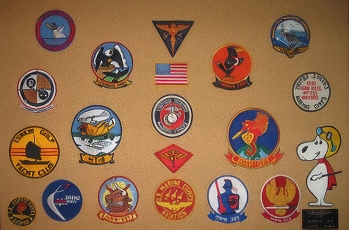
Losing friends from my enlisted service and from flight school was never easy, but Vietnam was a GOOD assignment for me because I was doing what I was trained to do. I asked to serve and asked to fly in Vietnam, and I knew how important our life-saving missions were, and we flew dozens and dozens of medivac missions.
The BEST assignment I had was when I was sent to Japan as a post-maintenance test pilot before returning home from Vietnam. I was used to the heat and humidity in Vietnam and managed to get a flight on a C-141 filled with mostly burn cases being transported to Japan for treatment in the burn hospitals. When I got off the plane to find where I needed to be, it was snowing! And I was wearing civilian clothes with a short-sleeve shirt. My orders had misdirected me to southern Japan, and I got on a “Bullet” train headed to Osaka. The gentleman next to me spoke broken English, and I spoke NO Japanese, so we started communicating by writing notes to each other as he was taught to write in English in school. Believe it or not, he had been a Japanese “Zero” pilot who flew in WWII. He showed me photographs of how they had “island hoped” south from Japan for battles against the US forces in the Pacific. He even had a photo of him sitting in the cockpit of his aircraft with a sign of DaNang, Vietnam, in the background. Because we were both pilots, we shared lots of interesting stories. I flew test flights in Atsugi for two full months and at an H-46 maintenance hangar much further south. Going from full combat flights to “civilian” type flying a day or two later with no rounds being fired at the aircraft was a HUGE change for me. When my replacement pilot showed up, I returned to HMM-265 in PhuBai to catch a flight home after my tour.
I really can’t think of a “least favorite” assignment because I grew up wanting to fly and loved being able to do just that. I can’t say that my enlisted training was my least favorite because I was being taught the best life skills and combat skills the Marine Corps had to offer.
From your entire military service, describe any memories you still reflect back on to this day.
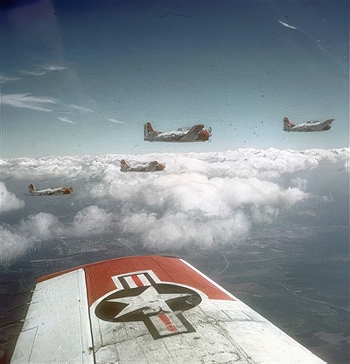
I remember how much I enjoyed flying the T-28 fixed-wing aircraft in training. I especially enjoyed flying west toward the sunset because it took forever for the sun to finally set since we were flying toward it so fast.
I still remember most of the combat helicopter flights vividly – like flying back from a night mission to the ship when we were low on fuel. Our TACAN (navigation instrument) was not working well & we were getting really low on fuel. We finally saw the lights on the USS Tripoli off the coast through the storm clouds. It was pretty frightening as we slid in for a landing on the ship because the strobe light effect from the lighting made it look like our rotor blades were stationary and not rotating at all! The most frightening part was when we touched our landing gear down on the deck of the ship. One of our engines flamed out from lack of fuel BEFORE we could shut the engines off!!!!
What professional achievements are you most proud of from your military career?
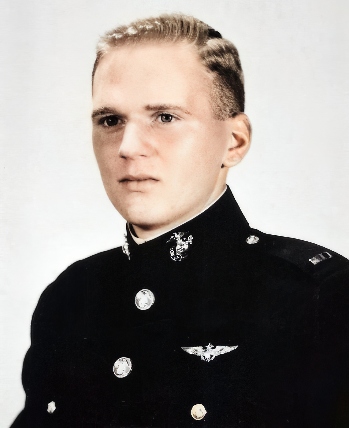
I am proud of the fact that the Marine Corps contacted me when I was 18 years old and pulled me from the enlisted ranks to go through flight school with military officers who had all graduated from college. When I enlisted and started boot camp, I was scheduled to be a military air traffic controller. I would have enjoyed doing that, but I much preferred flying!!
There were fewer than 1300 MARCADs in the Marine Corps since Congress enacted the Aviation Cadet Program in 1935. There were also NAVCADs (Navy Aviation Cadets) who went through the same program.
Of all the medals, awards, formal presentations and qualification badges you received, or other memorabilia, which one is the most meaningful to you and why?
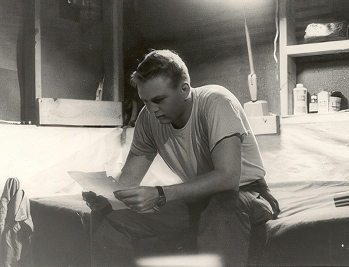
The most meaningful award for me was the night I earned the Silver Star. Many lights had not been able to get into a zone to resupply Marines in the daylight because the enemy small arms fire was so heavy. The Marines were in an area surrounded by an oxbow in the river. We were asked to resupply the company on the ground just as it was turning dark. I asked the crew if they were willing to go, and we took off from the staging area with a load of water, lots of ammunition, seven some 1st aid supplies. I asked the co-pilot to start calling off the altimeter readings every 100 feet once we got to 1000 feet. We were being guided to the landing area by a Marine holding a strobe light. We turned off all our aircraft lights, and I heard the co-pilot say, “1000 feet”, then “900 feet”, etc. Just as he said “400 feet,” I saw a muzzle flash beneath me and immediately felt the material on the left leg of my flight suit move. The enemy had fired toward the sound of our helicopter, and the round came up between my left knee and my right hand on the flight control stick and then in front of my chest and over my right shoulder. How could that round have missed me??? The material near the left ankle of my flight suit had moved when the plexiglass windscreen below my feet shattered.
Now I looked down and could not see the strobe light guiding us into the zone….but I did barely see a HUGE tree right in front of us. I did not have enough power to fly over it as we were descending rapidly but I “pickled” our net full of supplies and was able to fly around the tree and make an awkward landing – but not where the Marine had wanted us to land. The ground commander had four seriously wounded Marines in his unit who needed evacuating. He asked us to wait where we were until those wounded Marines could be brought to our location. While we were sitting on the ground with our rotors turning, the enemy continued to fire rounds toward the sound of our helicopter (even if they couldn’t see us). I had at least three rounds go through my side of the cockpit, and we had several other rounds hit the aircraft as we sat there, but we all got out safely and got those 4 Marines to the G4 hospital in DaNang before landing at Marble Mtn.
I think the squadron was stationed at PhuBai at the time, so we found a place to bunk down with another squadron and caught a flight up to PhuBai the next morning.
Which individual(s) from your time in the military stand out as having the most positive impact on you and why?
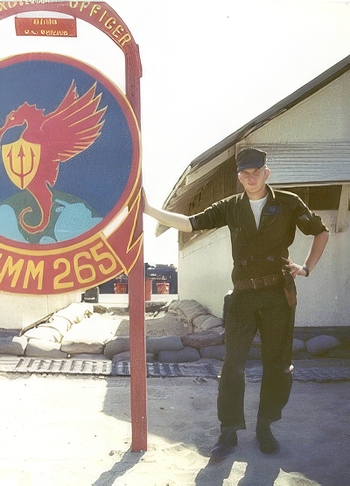
ALL of the men I flew with were true heroes for the work they did every day, but the one Marine who made the most positive impression on me was Col. Thussen. Our squadron had already gone thru 3 different Commanding Officers while I was there, and Col. Thussen was the next to be taking over the squadron’s command. He insisted on flying with each pilot in HMM-265 BEFORE becoming CO.
I thought that was really setting a great example and a great way to know his pilots and crewmembers.
If I remember correctly, he and I got to fly on two missions before joining the squadron. On the second of those missions, we lost the #5 seal on one engine, and we were streaming a thick black trail of smoke behind us as we flew over Marble Mtn south of the airbase. It was considered an emergency landing because the “A” model could not fly on one engine with the load we had on the aircraft – so I got to demonstrate my emergency procedures to the future CO. I had a lot of respect for Col. Thussen.
List the names of old friends you served with, at which locations, and recount what you remember most about them. Indicate those you are already in touch with and those you would like to make contact with.
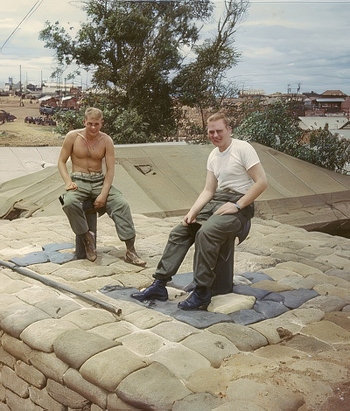
There are about a dozen former pilots and crew members from HMM-265 I still contact from time to time. We get together for squadron reunions from time to time, and I still communicate with some by email, phone, and social media. A local Marine who served in HMM-261 (that’s the squadron I was with on the Carib cruise) saw the USMC squadron sticker on my car and followed me until I stopped at a traffic light. Thirteen years after I had flown in that squadron, he served with them in Grenada and Beirut. I feel like he and his other squadron members have adopted me, and I attend local events with them and went to the 35th squadron reunion of those who served during Grenada and Beirut a few years ago.
There is a local group of Marines who get together a few times a year. We have a Marine who left the Corps in 1946 but later became an Air Force pilot who flew in the Orient in the 1950s, a Marine who served in Korea, several who served in Grenada and Beirut, and occasionally other Marines who join us from other states. I will ALWAYS remember when we all got together with our spouses at a nice restaurant, and someone picked up our entire dinner bill for us!! (The Marines who still have them always wear their dress blues to this annual dinner.)
My younger brother and I served in Vietnam, I Corps for about eight months. I was at Marble Mountain Air Facility east of the big Da Nang airstrip, and he was stationed at a small compound west of the big airstrip. The first contact we had over there was by landline, but we managed to visit each other a few times. We were both lucky to survive our combat tours over there. He was a radio operator in a command bunker and went on the field on missions every three days.
Can you recount a particular incident from your service, which may or may not have been funny at the time, but still makes you laugh?
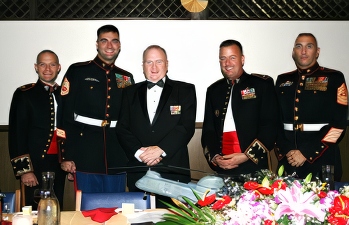
One of the funniest things I recall about my Marine Corps experiences happened 40 years after leaving the military. The present-day Commanding Officer of HMM-265 contacted me in 2010 (I left the Marine Corps in 1970), and he asked me to speak to his troops at the Marine Corps Birthday Ball. At first, I was sure he didn’t mean me, but he said he wanted me there. My wife and I had just been in a bad auto accident, and I had a broken rib and punctured lung, and lots of bumps and bruises, so I shouldn’t;t have done any traveling, but the Co insisted, so I finally agreed. After agreeing to speak at the squadron’s birthday ball, I asked him where the squadron was located? When he said Okinawa, I just about fell over!
Well, long story short, I went to Okinawa. The squadron not only treated me as a squadron member, but they also had Marines and Marine families assigned to take me to different areas on the island and different events. It was a spectacular time. After spending some time there, I noticed that I had the BEST suite in the whole motel. Technically I was a former Captain in the Marine Corps, and I went up to the Commanding Officer and asked him how I had managed to get the best quarters in the hotel? He smiled and said, “Oh, it was easy – I told them that you were a Colonel!!” 🙂 I guess in 40 years, the Marine Corps really had not changed!
What profession did you follow after your military service, and what are you doing now? If you are currently serving, what is your present occupational specialty?

As mentioned earlier, I felt it was necessary for me to get a college degree – but after leaving combat and the Marine Corps and the flying that I loved – I had a terrible time adjusting to civilian life. After two years of business college, I dropped out. I was at least years older than most students, and when I got to the college, most of the students were strongly opposed to the war I had just been in, and they did not look kindly on veterans.
The following year I started at an agricultural trade school in the university’s two-year Associate degree program. That was much more to my liking …. doing practical work in fields where I would enjoy working in a new career. I was trained to manage orchards, golf courses, landscaping, greenhouse management, etc. I graduated a semester early and ended up getting a job as a crop technician at the university and was eventually promoted to the position of farm manager at their large horticultural farm. It was great to work but didn’t pay well. One day, a former professor approached me and said that he had heard about a US Dept of Agriculture job. So seven years after leaving the military, I had a 2-year degree and a couple of years of greenhouse and farm managing experience, and I applied for a federal job in the field of agricultural administration.
Ten years after leaving the Marine Corps, I finally earned my Bachelor’s degree. At first, I worked at the county level as an Executive Director of farm programs, and my boss let me work Saturdays to go back to the university to get my 4-year degree. Over the years, I stayed with that one agency and moved from the county level to a multi-state auditor position, then back to NH to work in their state office and eventually to Washington DC, where I finished out my last three years as a National Program Director overseeing a crop storage and loan program that operated in 27 states.
We liked the area where we were living, so I took a job working in birding stores where we sold high-end optics as well as other bird-watching materials. I did that for seven years in several local stores, and we eventually moved further south for our real retirement. When the traffic got too congested in the DC and Alexandria area, we eventually decided to retire to coastal SC.
What military associations are you a member of, if any? What specific benefits do you derive from your memberships?
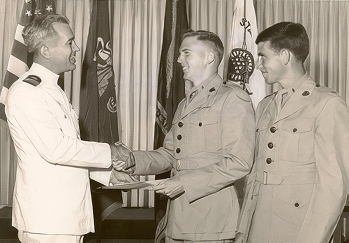
I belong to the local chapter of the Daedalians (group of former military pilots) because of my love of flying. Still, I am also a live member of the VFW, DAV, and Vietnam Veterans of America. I actively attend meetings at the local Veterans Center and have assisted some veterans in obtaining better veteran benefits.
I also participate in some local activities with veterans in the area but hesitate to join more groups because I wouldn’t have time to be a productive participating member.
The most rewarding work I did was to serve as a hospice volunteer for local veterans for a couple of years. I wanted to continue doing work in that area, but for health reasons, I had to give that up eventually.
In what ways has serving in the military influenced the way you have approached your life and your career? What do you miss most about your time in the service?
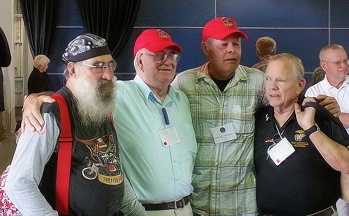
What I really miss most from the military is the comradery. All through training and especially in combat, there was always the feeling that “I’ve got your back, and I know you have mine.” The Marine Corps taught us real good lessons in teamwork, and I actually learned to trust some people. That feeling of trust just didn’t seem to exist in the civilian workforce. It seemed that many people were advancing by stabbing you in the back and not by protecting your back. If I had known in 1970 the big difference between life in the military and life as a civilian, I expect that I would have stayed in the Corps longer than I did.
I also miss the friendships made in the military. I do have many friends I served with who all still keep in touch – mostly through reunions and email messages, but with the other friends I have not seen for years, I am sure that if we were to meet, we would be able to star up right where we left off. That’s the kind of friends we made in the service.
Based on your own experiences, what advice would you give to those who have recently joined the Marine Corps?
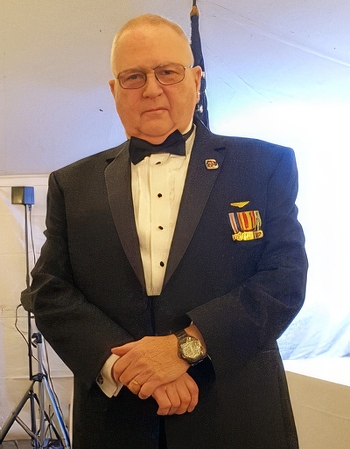
I am a strong supporter of the military – any branch, any service. I would highly recommend that all eligible men and women spend some time serving their country. I am always grateful that I was able to serve in the Marine Corps!
My advice would be for those about to join the Marine Corps. I was in an early enlistment program and asked a co-worker (who had recently been discharged from the Corps) what I could do to get ready for boot camp. He thought for a minute and said two things. He said, “Run, run everywhere all the time and go out in the woods and yell!” “Learn how to raise your voice and project your voice.” That sounded strange to me, but it turned out to be good advice!!
In what ways has togetherweserved.com helped you remember your military service and the friends you served with.
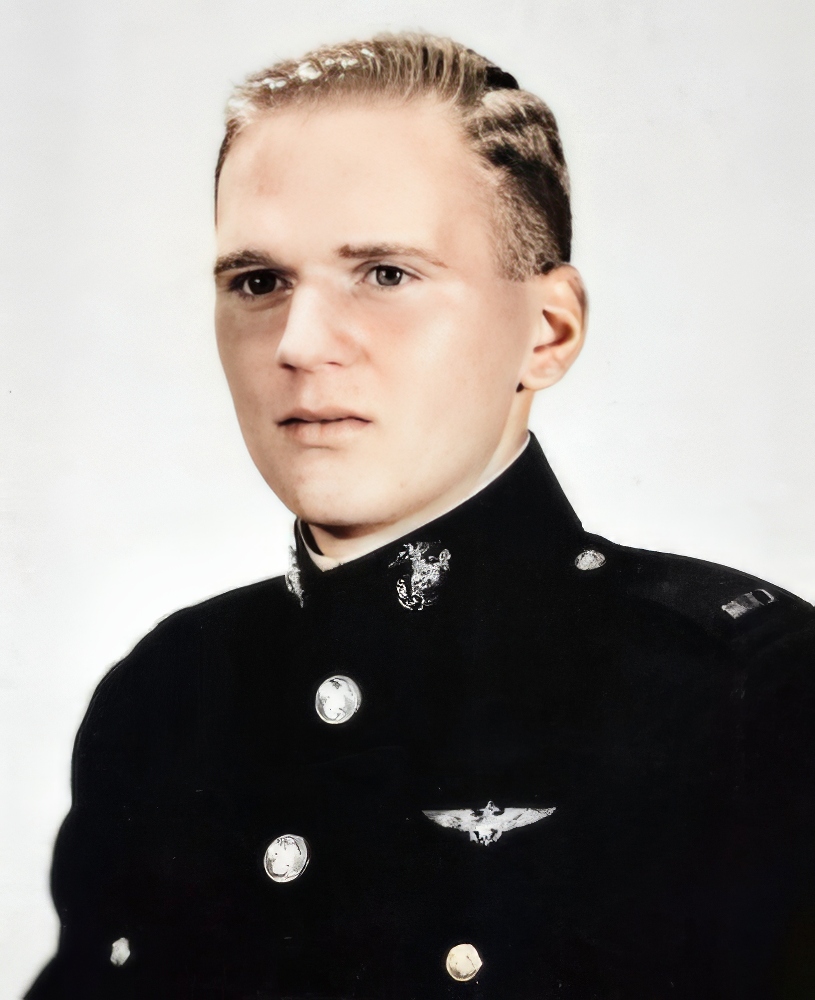
I don’t use TogetherWeServed.com very often, but each time I do, I spend time looking up those I served with in the past. Once in a while, I will make a connection with a former squadron mate or friend from flight school, but our numbers are decreasing as we all age.
PRESERVE YOUR OWN SERVICE MEMORIES!
Boot Camp, Units, Combat Operations
Join Togetherweserved.com to Create a Legacy of Your Service
U.S. Marine Corps, U.S. Navy, U.S. Air Force, U.S. Army, U.S. Coast Guard
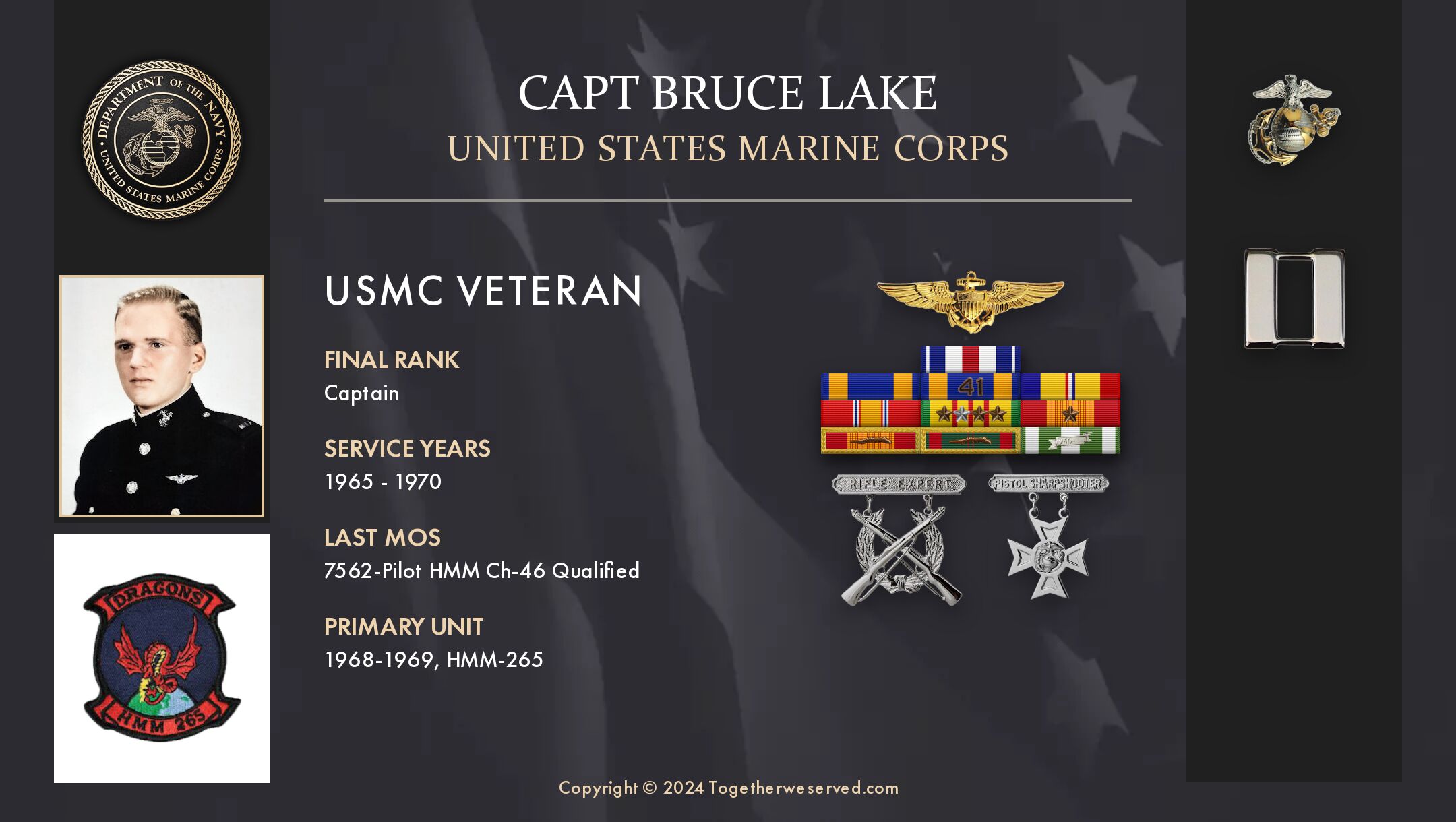
0 Comments